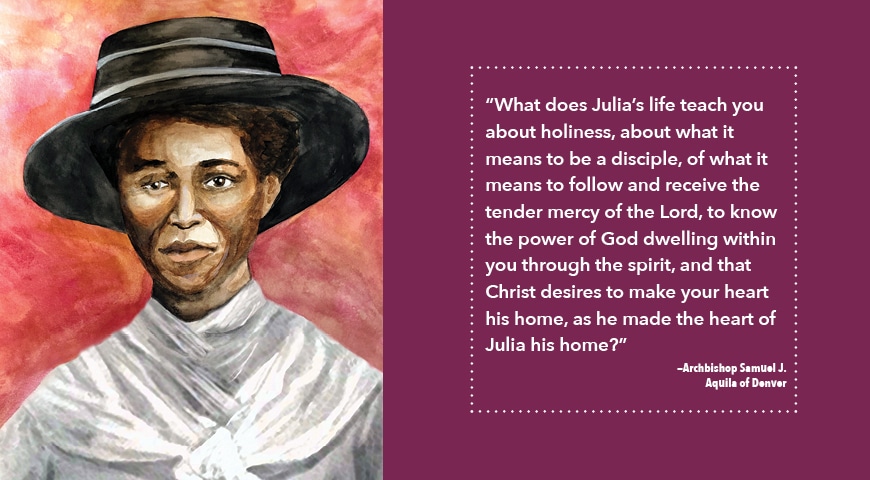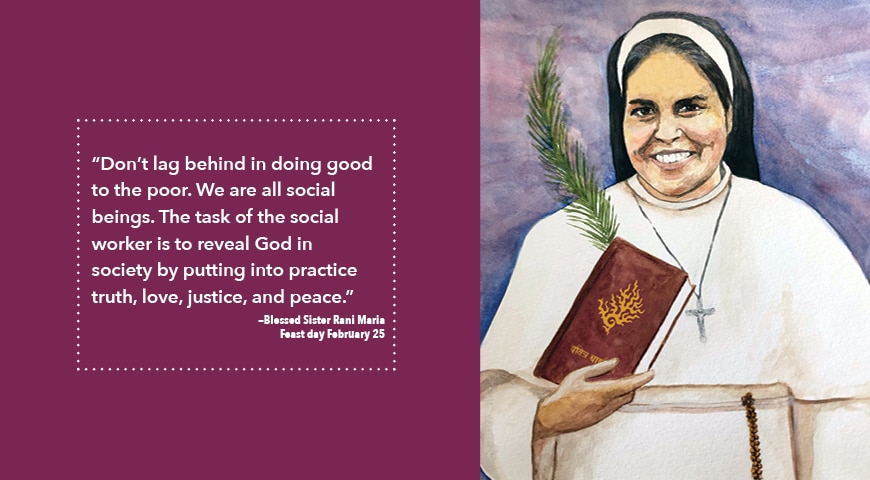“I’m no saint,” we may tell ourselves. But stories of the saints show us that we, too, are capable of extraordinary faith, courage, and love.
Because I was a cradle Catholic, the stories of the saints were a staple in my household. The saints were a constant presence in my life and in my catechesis; yet I found myself often turning away from them in my personal prayer and reflection. I struggled with the idea that I was not good enough to ever achieve sainthood. The lives of the saints seemed like the lives of the superheroes. The older I got, the more it shifted from Catholic “superhero” stories to stories that didn’t relate to my own personal life and struggles . . . or so I thought.
The stories of the saints have been impacting me in ways I couldn’t see until years later. Their legacies, faith, and strength have influenced my life as a Catholic, even in the moments where my aversion toward them seemed to keep me immune to their stories. The promise of sainthood looks a lot like the walk to Emmaus. We do not walk to the table where we break bread with Jesus alone; we walk there with the saints, in a relationship of accompaniment that marks our lives in this world and the next.
There are many saints who have transformed me and torn away the coldness in my heart. Saints have taught me that there isn’t just one way to love God and love others. One of the beautiful facets of the Catholic faith is how it holds up examples of holiness and God’s presence among us from a wide range of cultural backgrounds.
St. Oscar Romero: Champion of the Oppressed
The story of St. Oscar Romero is marked with poverty, justice, and liberation. Romero, among the eldest siblings in his family of nine, grew up poor in a town near the border between El Salvador and Honduras. He knew from a young age that he wanted to become a priest and was ordained in 1942 while in Rome, where he had finished his studies at the Gregorian University. Romero had hoped to continue his studies, but because of a lack of priests in El Salvador, he returned to his home country to serve as a pastor for his people.
In the early years of his priesthood, Romero wanted to simply live out his vocation as a parish priest, conservative in his social and theological views of his role in the community. In 1977—the same year Romero became archbishop of San Salvador—his friend and brother priest Rutilio Grande, SJ, was murdered because of his alliance with the poor in El Salvador and his advocacy in helping them secure justice against social and political oppression.
This event shifted the trajectory of Romero’s life and mission to love and serve those at the margins. Romero’s life story taught me that we cannot ignore the suffering in this world simply because we know that suffering will always exist in this life. That cannot be an excuse for us to be indifferent or silent toward the ways social, political, and even Church structures oppress and silence the voice of the marginalized. We must find ways to encounter the poor and the oppressed, to empower their agency as children of God.
Quarantined at home for several months during the coronavirus pandemic like so many across the world, I found myself with time. During this period, I picked up A Prophetic Bishop Speaks to his People, a compilation of the homilies given by St. Oscar Romero in El Salvador. With every page I found space to house my anger and hopelessness in regard to social injustice and racial inequity. St. Oscar was a reminder to me in this moment of what it looks like to be a champion for the liberation of others, to live out a Gospel message that directs us to love our neighbor.

Servant of God Julia Greeley: Seeing Christ in the Poor
Servant of God Julia Greeley was born into slavery and is among six Black Americans being considered for sainthood. Her story is marked by the way in which she proactively loved the poor, standing in solidarity with the marginalized community in the city of Denver.
Her story began in Hannibal, Missouri, where she experienced the bondage and cruelty of slavery; she was emancipated in 1865 and found herself employed as the housekeeper for a wealthy family in Denver. She became Catholic in 1880. Only in the past few years has Julia Greeley’s story started to be widely circulated, capturing the hearts of members within the body of Christ who are enraptured by her love for others despite the evils she endured in her lifetime.
Julia never turned away any of the poor who came to her seeking assistance, even though she herself was lacking in material possessions. She knew that to see Christ in the other meant to love with what society would often deem “reckless actions”—to bring alms, to hold, support, and empower others. Julia’s story ends with a funeral full of life, full of Denver’s poor coming to pay respects to the woman who not only saw Christ in them but with that very act empowered their God-given human dignity.
It is this gift of life that we must embrace as a Church, a life full of diversity within the body of Christ, and the human dignity within each of us that calls us into communion with each other. Julia’s ability to love her neighbor still speaks to us today and draws us into the Gospel message.
As a Church marked by the evils of slavery, racism, and white supremacy, it keeps us accountable to reconciling with our past and proactively working to create a future where all members of the body of Christ are upheld as having been made in God’s image and likeness.
It’s very easy to say that we see Christ in others, if those others are our friends and family. It’s easy to see Christ in the people we love, in the people who respect our space, in the people we know well. But that’s not the point of what it means to see Christ in the other, and if this is all we do, then we have missed the mark.
As a Church, we need to continue to share the story of Servant of God Julia Greeley in our parishes, in our diocesan offices, and in our formation classes. Her story is not only one of resiliency but also one of a woman who lived through the absolute evils of white supremacy, racism, and slavery, and still loved her neighbor. Yet we must remember as a Church that even though Julia loved her neighbor, that does not mean making excuses or justifications for the way white supremacy and racism live still within our Church institutions.

Blessed Rani Maria: Martyr for Social Justice
Blessed Rani Maria Vattalil was born on January 29, 1954, in a small village in India. Baptized into the faith as an infant, she would later discover her baptismal calling to religious life as a member of the Franciscan Clarist Congregation. Like Servant of God Julia Greeley and St. Oscar Romero, Sister Rani Maria devoted her life to loving service and empowerment of those at the margins of society. She could be found teaching children outside under the trees, working with the community to provide adequate educational resources for these children. Her zeal to stand in solidarity with the marginalized was a force of liberation within her community, where she advocated not only for local children, but also for the homeless, the elderly, women, and farmers.
The love that she encountered in her vocation, the love of Christ that transformed her, and the love that she had for others proved to be a relentless call to action in seeing Christ’s love become manifested in her work for social justice. Sister Rani Maria knew that Christ was for the poor, and so we, too, must be for the poor.
On the morning of February 25, 1995, Sister Rani Maria entered the convent chapel to pray before boarding a bus that would take her to do her holy work with the people. Having missed the first bus, she boarded the second, and hours later the police would call her convent to state that Sister Rani Maria had been murdered. An assassin had boarded the bus and brutally stabbed her in front of the crowd, dragging her body off the bus where she would take her last breaths, saying, “Jesus, Jesus.”
We often get scared of the line “to be for the poor” and what it would cost us. We live in a world marked by materialism, individualism, greed, and the need to be successful by the terms and standards of economic growth. The culture in America today does not make space or encourage solidarity with the poor.
Today’s culture tells us that the cost is too high. You can donate a few dollars to a charity, go to that local silent auction, or share that petition online—but to actually be with and for the poor? It’s scandalous.
At times it’s even scandalous to say these words within the American Church. We have seen the way the “prosperity gospel” narratives sweep across our churches and pews: the belief that if we have money and others don’t, there must be some divine reason why. It cannot simply be because we have set up a society that works toward success at the cost of the poor.
The story of Blessed Rani Maria is striking because of what it reminds and, in many ways, demands of us as a Church, as members of a universal body of Christ. Blessed Rani Maria understood this, and the God of liberation transformed her to be a vessel of life and love for the poor. She worked to restore their agency within community and society, to share with them the promise of God’s love for all people, to empower them to be known as children of God. Sister Rani Maria knew that God had called her to love recklessly, and she did, even though it cost her life.
Finding Our Divine Purpose
The stories of St. Oscar Romero, Servant of God Julia Greeley, and Blessed Rani Maria have shown me why we proclaim the lives of the saints, those who dedicated their lives to sharing the hope of the Gospel. We must carry their stories within us because each of us has been created with a divine purpose to live our lives marked by the Gospel. The lives of the saints are not meant to make us feel small, they are not meant to feel unattainable, and they are not the stories of superhuman beings.
St. Oscar Romero, Servant of God Julia Greeley, and Blessed Rani Maria all lived lives marked by the promise of liberation that Jesus brings forth through his life, death, and resurrection. They became vessels of God’s hope to God’s people. They allowed themselves to be transformed by the truth of Scripture, practicing the traditions and teachings of our faith in a way that welcomed all people to the table. As a universal Church, we can learn from these three holy people how to love our neighbor, make space for others, and live daily lives marked by the love of the Gospel.
The lives of the saints beckon us onto the road to Emmaus. They draw us into the conversation of faith, life, and the ways in which we can love each other and, in doing so, love God. They draw us out of isolation, indifference, and darkness to walk along a road that leads us to a table where everyone is welcomed to come and break bread with the Messiah.
St. Oscar Romero, Servant of God Julia Greeley, Blessed Sister Rani Maria: Pray for us. Walk with us. Break bread with us.
Artwork of Oscar Romero, Julia Greeley, and Rani Maria by Leanne Bowen








